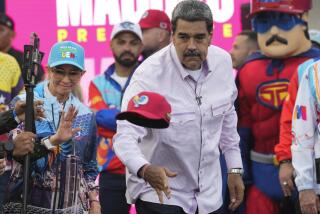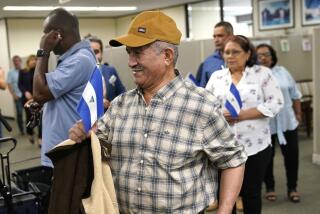At Least $75 Million Needed to Win War, Contras Say
- Share via
WASHINGTON — Three Nicaraguan rebel leaders met with Secretary of State George P. Shultz on Tuesday and told him they need $75 million to $100 million in U.S. aid this year to succeed in overthrowing the leftist Sandinista government.
“We can continue the struggle without the money, but we cannot win,” said Alfonso Robelo, one of the political chiefs of the rebels, known as contras.
“Whenever I see a Nicaraguan, I get the question: Can you win?” he said. “The answer is ‘yes,’ if we get adequate help. Now is the time for that help if we don’t want this thing to drag on forever.”
Adolfo Calero, another contra leader, said he estimates that the rebel forces need “$75 million, $100 million.” He said he believes the chances of winning military aid from Congress have improved. “Things look a lot better (in Congress),” Calero said.
The Reagan Administration is preparing to ask Congress for military aid to the rebels, whose 17,000-man force has enjoyed little success on the battlefield. The contras received about $80 million in covert military aid through the CIA from 1981 until 1984, when Congress halted the program for a year.
Last year, Congress resumed giving aid to the rebels, setting up a $27-million fund that was not to be used for buying weapons or ammunition. That fund runs out March 31.
Robelo, Calero and a third contra leader, Arturo Cruz, visited Shultz to present him with a copy of their latest political platform, which proposes a “provisional government of national reconciliation” to replace the current, pro-Soviet regime. They spoke to reporters after the meeting.
The program calls for dissolution of the Sandinista internal police, abolition of most state-owned economic enterprises and new elections after 18 months.
After a 45-minute meeting, Shultz issued a written statement hailing the platform as “very much in keeping with the democratic trend in the rest of the region, a trend which the government of the United States strongly supports.”
More to Read
Sign up for Essential California
The most important California stories and recommendations in your inbox every morning.
You may occasionally receive promotional content from the Los Angeles Times.














